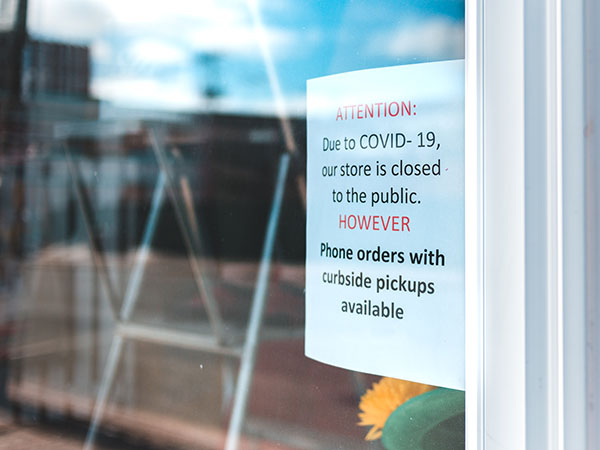In October the Firm published an article addressing various business implications resulting from the Covid 19 pandemic, including a “heads up” warning that most business interruption policies would NOT cover losses related to a biological pandemic due to an exclusionary clause now found in most ISO standard form insurance contracts. Since that time, there have been several legal updates impacting this and other business aspects.
I. Business Interruption Insurance
August 2020 witnessed the first known legal decision permitting a Plaintiff’s insurance claim for Covid 19 related business interruption damages to proceed to trial. In K.C. Hopps vs The Cincinnati Insurance Company, Judge Stephen Bough, federal judge for the Western District of Missouri, ruled against the insurer’s Motion to Dismiss by concluding sufficient allegations existed that COVID 19 had deprived K.C. Hopps of its property by making it unsafe and unsuitable for customers to use, allowing the dispute to proceed to trial for a final decision. While policy and fact specific, this case represents one of the first cases in the nation to open a chink in insurers’ policy defenses against COVID 19 related claims and should be watched carefully for final resolution.
II. COVID 19 Impact on Standard Form Construction Contracts
The Firm’s August 2020 article additionally addressed the legal doctrine of “force majeure” under the pandemic factors. As a reminder, “force majeure” contract clauses typically excuses a party’s performance where the event is : (i) unforeseeable, and (2) outside a party’s control. As such, these clauses allocate risk of natural and unavoidable catastrophes that affect contract performance. In the commercial construction world, the term “force majeure” may not appear in standard AIA or Consensus Docs but instead appears through remedial clauses such as modification for delay and time extension relief.
As always, the parties must start with review of their existing contract language. If their force majeure or related remedial clause identifies “epidemic”, “pandemic”, “outbreak of disease”, or other similar terms, then the COVID 19 delays would be covered under that clause. However, other contracts may limit relief to more generalized triggers such as nature (e.g. severe floods or earthquakes). Often the courts will strictly construe such remedial clauses to exclude events not specifically named in the contract, making COVID 19 delays less likely to be covered. Also state by state case law may govern, where some states strictly identify “acts of nature” to exclude pandemics, while others permit it. And even if the clause permits a remedy, most often that remedy is limited to a time extension versus both time and damage recovery.
A. AIA A201-2017 General Conditions
This document, used by many contractors in the industry, does not specifically address “force majeure” delays but in Section 8.3.1 Delays and Extensions of Time includes a broad catch-all terminology that permits excusable time extensions for various events “outside the Contractor’s control”. This standard contract form also permits a contractor to terminate a contract if that contractor is prevented from performance for a period of 30 consecutive days “through no fault of the Contractor for “an act of government, such as declaration of national emergency, that requires all Work to be stopped”.
B. ConsensusDocs
ConsensusDocs is less ambiguous on COVID 19 delays, where Form 200-2017 Standard Agreement, Article 6.3 between a Contractor and Owner specifically identifies “epidemics” as an excusable delay and permits the contractor right to an equitable extension of time.
C. DBIA
DBIA form which incorporates the Standard Form of General Conditions (DBIA 535, 2010 Version) specifically mentions force majeure and defines it as events beyond the contractor’s control, “including epidemics”. Section 8.2 of the DBIA form (delays to work) carves out force majeure events, prohibiting price adjustments for these events but allowing a back door approach to time and cost recovery by characterizing the claim event as related to “differing site conditions” and “hazardous conditions”.
D. Federal, State, Local Construction Contracts
While federal contracts do not address “force majeure” claims, FAR 52.249-14 (Excusable Delays) lists specific examples of recoverable delays including: “epidemics” and/or “quarantine restrictions”. However, the contractor is not excused from meeting their burden of proof related to accuracy of delay impact documentation.
State and local public contracts should be carefully reviewed to identify either force majeure clauses or treatment of other “excusable” delays.
III. Other Doctrines
Finally, if you discover your contract is silent as to either “force majeure” or the other related delay clauses above, the common law doctrine of “commercial impracticability” may apply to offer relief. While not recognized by all states, it is a concept included in the Uniform Commercial Code adopted by most states, as well as the Restatement (Second) of Contracts which outlines various contract construction standards utilized by both courts and attorneys.
IV. Suggested Strategies
As a review to the prior article, suggested strategies include the following:
1. Review your Forms
If you have not already done so, now is the time to review both your insurance policy for business interruption coverage (i.e. does it specifically exclude coverage for pandemics or related terms); and your standard form construction contracts (i.e. how does it address either “force majeure” or delays beyond a contractor’s control).
2. Record Impacts and Mitigate Damages
If you’re experienced delays or interruptions related to COVID 19 events, it is important to immediately review your cost accounting mechanisms to isolate and track COVID 19 specific impacts, delays and extra costs. The contractor then has a duty to identify modifications to means and methods sufficient to reduce or eliminate factors under the Contractor’s control. This might include work at home orders, changes in scope sequence to permit certain safer scopes of work to be performed while completing other, more high risk exposure scopes at a later date. The contractor should also start an open communication line with all players to coordinate the response, while additionally watching and recording any governmental actions, orders or legislation and their applicable dates and impact on the project and the contractor’s performance.
3. Submit timely written notices of delay
Again, as driven by the specific contract language, be sure to submit timely and accurate notices of delay as specified within the contract document.When drafting these notices, be mindful of whether it is precise and fact based versus emotional. Consider how the wording will be received and how it might appear to a third party judge or jury at a later time. The more fact specific and documented, the stronger its basis for a claim.
In summary, we are living in a brave new world where many standard clauses and methods of addressing business interruption have been flipped on their head. Case law remains unsettled, but utilizing common sense in conjunction with the above principles and suggestions should pave the way for working through the COVID 19 pandemic.
Link to Prior Article: Contract Obligations And Defenses under Covid-19
© Denise E. Farris. (December 3, 2020). This article may not be reprinted or reproduced in any manner without the consent of the author. This article is not intended to be the provision of legal advice. For fact-specific questions, refer to an attorney licensed in your state. Contact: Denise Farris, Farris Legal Services, LLC. [email protected].










